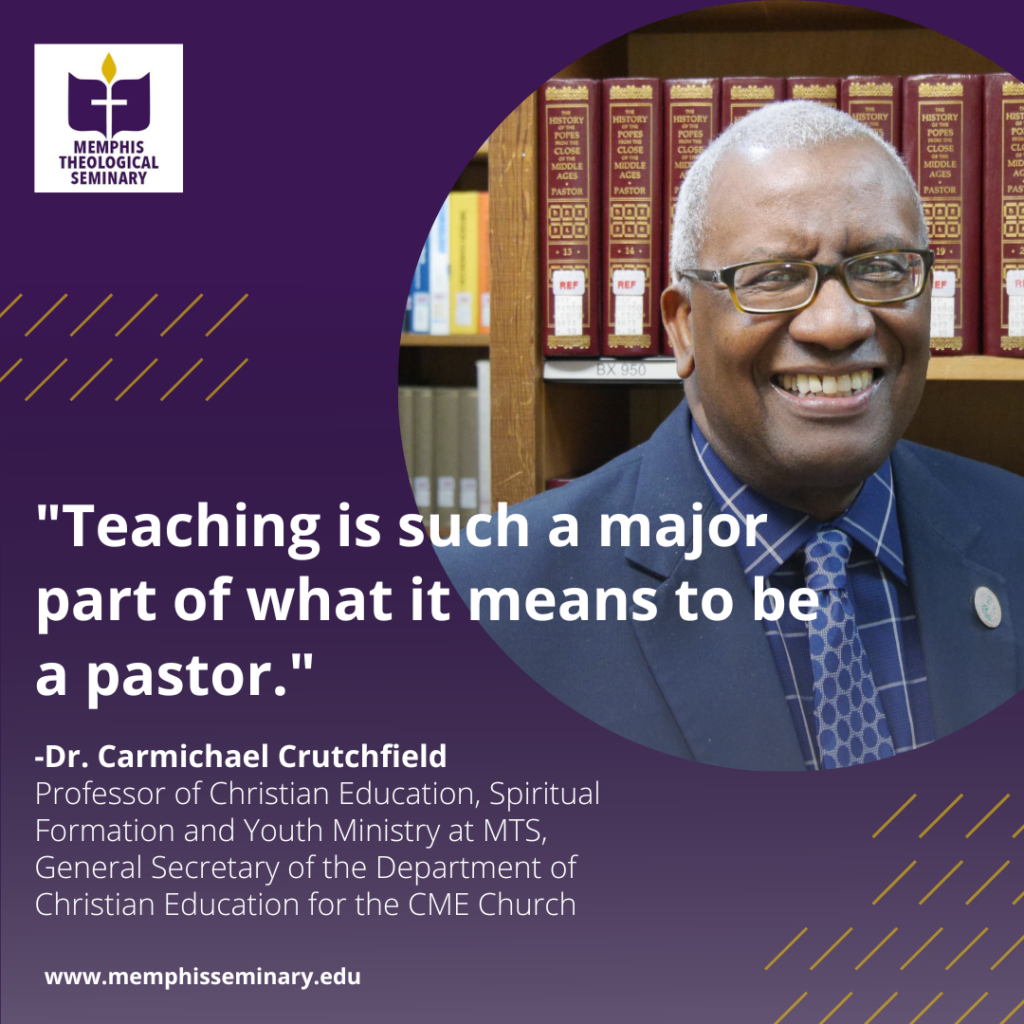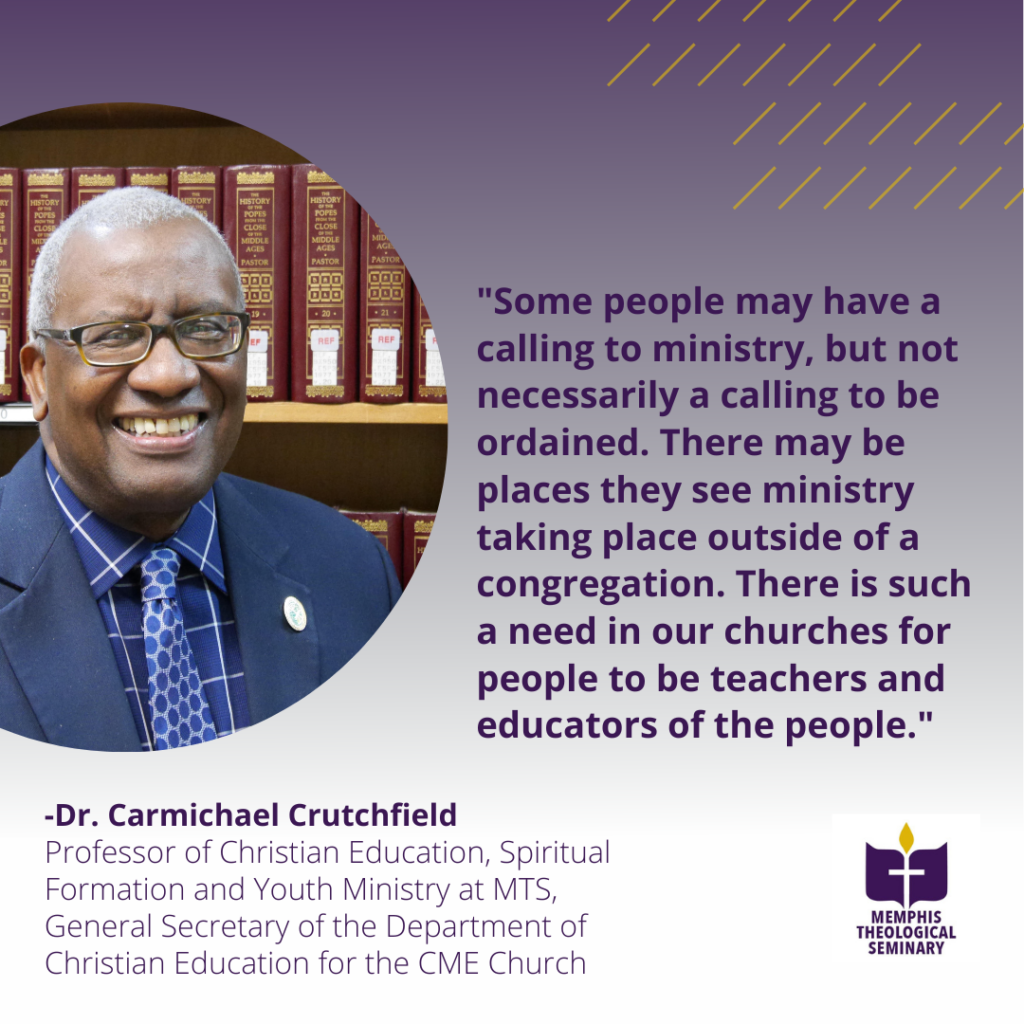The Master of Arts in Christian Ministry is a degree specifically designed for persons who desire knowledge and skills in a particular area of ministry outside of congregational leadership.
To that end, the MACM has concentrations in the following three areas: Chaplaincy, Christian Education, and Social Justice. Each of these concentrations features courses specific to the ministry specialization, along with internships and practicums in which theological study is intertwined with experience in a ministry setting, including a capstone experience in the MACM Integrative Seminar taken in their last semester of studies. Students complete 48 credit hours for the degree, compared to the 84 hours required for the MDiv degree.
The Christian Education specialization includes emphasis upon formation in the Christian faith at various age levels and draws upon a number of different pedagogical models for Christian Education. The lead faculty member in this area is Dr. Carmichael Crutchfield, the Clara Scott Chair of Church Ministry and Professor of Christian Education, Spiritual Formation, and Youth Ministry at MTS. Dr. Crutchfield is also the General Secretary of the Department of Christian Education for the CME Church and the author of several books on Christian education.

Dr. Crutchfield says, “The Christian Education Specialization offers both ordained and laity an opportunity for increased understanding about various components of Christian education. It provides an opportunity for one to sharpen skills and enhance the ministry of Christian education in local churches. Included in the concentration is emphasis on the ministry with all age levels. This includes children, youth, young adults, emerging adults, and older adults that I like to refer to as super adults.’
We recently sat down with Dr. Crutchfield and asked him about the MACM, the Christian Education specialization, and his own call to serve as a pastor and a teacher:
Q: How would you differentiate the MACM from the MDiv? How might the MACM serve certain students better than a MDiv?
“The MDiv traditionally has been a degree for people who are seeking ordination, or who are already ordained, or who are already pastoring. The MDiv helps prepare people for traditional pastoral ministry. But some people may have a calling to ministry, but not necessarily a calling to be ordained. There may be places they see ministry taking place outside of a congregation. There is such a need in our churches for people to be teachers and educators of the people, and that need sometimes goes beyond what the pastor has time or even is equipped to do.
If a person did a MACM and concentrated in Christian Education, they would have access to a plethora of classes in that area, whereas if they did an MDiv, they’d only be required to do one class in Christian Education.”
Q: Could you tell us about your journey in Christian Education?
“While I was in seminary, I was a pastor as well. I saw teaching as my main focus, and still do as a pastor. So when I go to the classroom now, I like to tell the class that I teach Christian Education with the pastor’s heart. I am a pastor with a Christian Educator’s heart.
Teaching is such a more major part of what it means to be a pastor. I have seen over the years, some seminaries don’t even require a Christian Education class any longer for those getting an MDiv, which I think is strange. But a lot of people going into ministry assume that education is somebody else’s job, that there is a group of people who will be doing the teaching, doing the Christian Education, but in most places that is not true, particularly in African American congregations where oftentimes people volunteer to do that. The least we can do for people is to help them improve their skills. I was inspired by seminary to teach even more than I was before I went to seminary.”
Q: Could you describe your role as the General Secretary of the Department of Christian Education in the CME church and how it intersects with your role at MTS?
“I’m pastoring now and the things that I do as a pastor and as the General Secretary are informed by what I teach at MTS. Then on the other hand, I write resources for the church and those resources inform what I do at the seminary. I really see no separation between the two. It makes sense because one, as I said, informs the other.
I think students who take Christian Education are benefiting from the fact that I’m not only giving them some theory, I’m giving them practical information. I was an accounting major in undergrad and there was one class in particular that was taught by a CPA. He would always say to us, “This is the way the textbook says do it. This is the way you do it in the real world.” So that’s what I feel I do at MTS. I give people the textbook, but I also give them the real world. Then I do the same thing for the church. I want people to undergird their practice with theory as well, and their theory with practice.
A couple of years ago, two of my church members joined a class on curriculum, and they were thrilled to be in that class. They were thrilled to be on the seminary campus. All along, they thought this was not for them because they’re not preachers. But when they left that class, they understood that seminary is more than just for preachers.”

